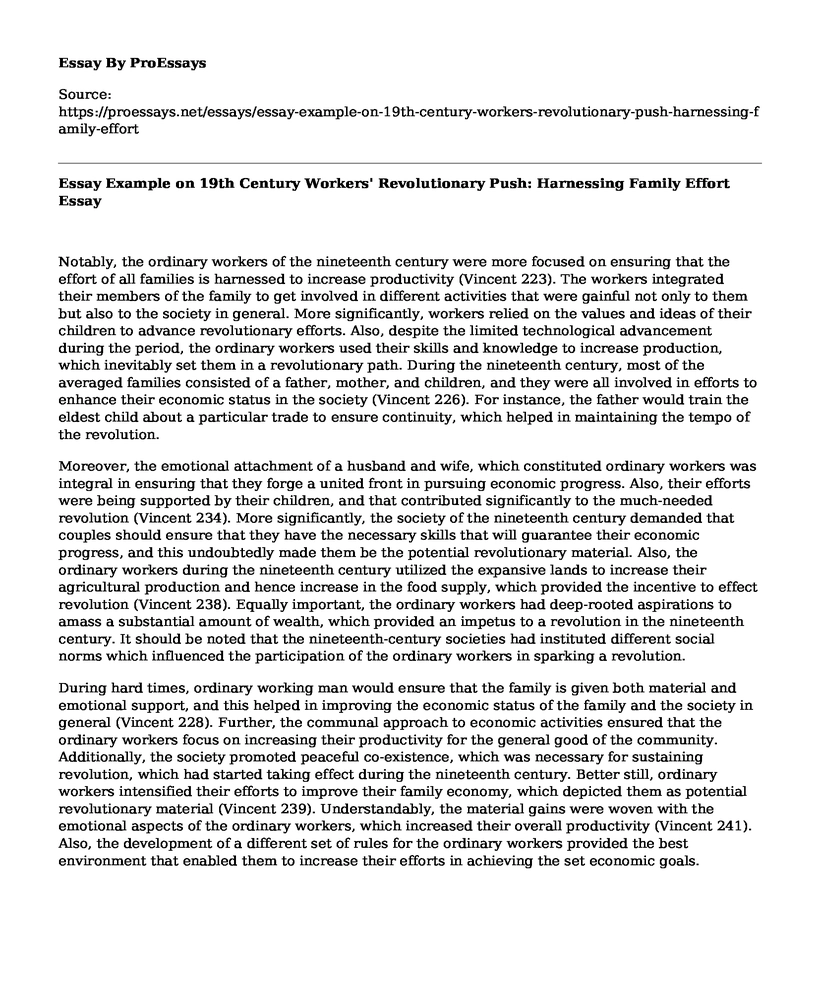Notably, the ordinary workers of the nineteenth century were more focused on ensuring that the effort of all families is harnessed to increase productivity (Vincent 223). The workers integrated their members of the family to get involved in different activities that were gainful not only to them but also to the society in general. More significantly, workers relied on the values and ideas of their children to advance revolutionary efforts. Also, despite the limited technological advancement during the period, the ordinary workers used their skills and knowledge to increase production, which inevitably set them in a revolutionary path. During the nineteenth century, most of the averaged families consisted of a father, mother, and children, and they were all involved in efforts to enhance their economic status in the society (Vincent 226). For instance, the father would train the eldest child about a particular trade to ensure continuity, which helped in maintaining the tempo of the revolution.
Moreover, the emotional attachment of a husband and wife, which constituted ordinary workers was integral in ensuring that they forge a united front in pursuing economic progress. Also, their efforts were being supported by their children, and that contributed significantly to the much-needed revolution (Vincent 234). More significantly, the society of the nineteenth century demanded that couples should ensure that they have the necessary skills that will guarantee their economic progress, and this undoubtedly made them be the potential revolutionary material. Also, the ordinary workers during the nineteenth century utilized the expansive lands to increase their agricultural production and hence increase in the food supply, which provided the incentive to effect revolution (Vincent 238). Equally important, the ordinary workers had deep-rooted aspirations to amass a substantial amount of wealth, which provided an impetus to a revolution in the nineteenth century. It should be noted that the nineteenth-century societies had instituted different social norms which influenced the participation of the ordinary workers in sparking a revolution.
During hard times, ordinary working man would ensure that the family is given both material and emotional support, and this helped in improving the economic status of the family and the society in general (Vincent 228). Further, the communal approach to economic activities ensured that the ordinary workers focus on increasing their productivity for the general good of the community. Additionally, the society promoted peaceful co-existence, which was necessary for sustaining revolution, which had started taking effect during the nineteenth century. Better still, ordinary workers intensified their efforts to improve their family economy, which depicted them as potential revolutionary material (Vincent 239). Understandably, the material gains were woven with the emotional aspects of the ordinary workers, which increased their overall productivity (Vincent 241). Also, the development of a different set of rules for the ordinary workers provided the best environment that enabled them to increase their efforts in achieving the set economic goals.
Conclusion
In conclusion, it is worth noting that ordinary workers were instrumental in enhancing the economic status of their families. The common approach to production, where a family unit supported each other's efforts, demonstrated the revolutionary potential of ordinary workers. Moreover, they possess skills that helped them in navigating the hard times to register improved production. More significantly, their social, cultural, and economic homogeneity proved to be beneficial in advancing the much-needed revolution. Also, the ordinary workers of the nineteenth century had common attitudes of promoting the economic progress of the society by training their children, which helped in sustaining the pursuit of revolution. It should be noted that the shared belief about the need to bring prosperity to the society made the nineteenth century's ordinary workers a potential revolution material.
Work Cited
Vincent, David. "Love and death and the nineteenthcentury working class." Social History 5.2 (1980): 223-247.
Cite this page
Essay Example on 19th Century Workers' Revolutionary Push: Harnessing Family Effort. (2023, Mar 16). Retrieved from https://proessays.net/essays/essay-example-on-19th-century-workers-revolutionary-push-harnessing-family-effort
If you are the original author of this essay and no longer wish to have it published on the ProEssays website, please click below to request its removal:
- The Significance of the Civil War for the Nation Essay
- Robert Wood Johnson Foundation Committee Initiative on the Future of Nursing and IOM
- The Texas Revolution Essay Example
- Political Causes of American Civil War Essay Example
- Essay Sample on Rochester and Western New York History
- Essay Sample on WWII's Impact on US: Lasting Effects of a Devastating War
- Essay on Singapore: Ancient Buddhist Kingdom of Srivijaya's Outpost Since 5th Century AD







